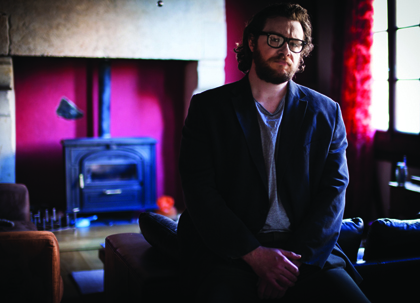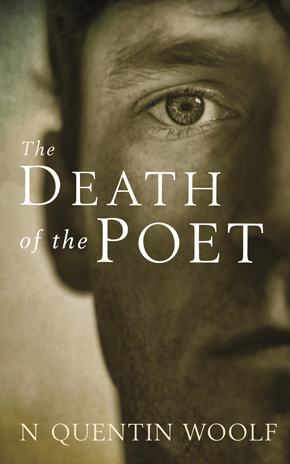The conversation
by N. Quentin WoolfBefore my novel The Death of the Poet was published, I was used to experiencing certain sorts of conversation about writing. After all, that’s what I do for a living – talking and writing, I mean. Talking, as in radio; writing, as in novels; talking about writing, as in critical discussion. For a good number of years I’ve run critique groups for writers. We gather each week and share texts; I enjoy taking the façade off pieces of writing and moving around within them. It exercises the right neural pathways, whether you happen to be thinking about your own work or someone else’s, and in the latter case you confront literary predicaments you wouldn’t necessarily encounter through your own practice. It’s great training. So I’m used to that sort of conversation. And I’m also used to the sort of conversation that isn’t about how a story is written, but instead springs from the ideas at play in the text. My novel couldn’t have been written without the fuel of several dozen discussions held off the page, in which the themes of the book got booted about by friends late into the night. This is healthy. This is literature. Done right, a novel is a porous wall, allowing ideas to pass through in both directions. It is itself a conversation. And then, lastly, there are conversations in the style of book-group meetings. I’ve always found this type of conversation difficult to accommodate: once you get used to the idea of having agency over the words in a piece of writing, reverting to passivity seems a challenge too far. At best, I can bring an author’s-eye-view to the discussion, but among readers this feels cold; while they are rightly wrapped up in characters and predicaments, I’m busy looking under the hood.
So far so good. And then came publication.
One of the questions in the academic study of fiction is how useful it is to import biography into the reading of a text. This spawns sub-questions: is a text’s morality derived from the morality of the person who wrote it, or is it independent? When assigning meaning to a text, should the reader seek to know more, or less, about the author’s life? Do we assume that every character is a manifestation of the author’s views or personality, disguised with whatever degree of success? I’ve always been of the view that creating a sense of authenticity has little to do with experience, and much more to do with knowing how to give the impression of authenticity – it doesn’t matter whether you’ve done X, Y or Z, it matters whether you can make the reader believe you have. So for me, the less that’s known about the author, the better. What could be more distracting from the digestion of a writer’s fantasy than the towering authorial image vying for attention? It would be like seeing not only the boom mic drop into shot during a movie, but also the director on his cherry-picker, complete with megaphone. Being conscious of the writer is bad for the reading experience. It damages the writer’s ability to make magic (which is no small thing – this is fiction we’re talking about), and it forces the creation of a false point of reference for everything in the story, as we are invited to stack the contents of the story up against the persona and behaviours of the scribe.
At first, it was restricted to broad issues of process, but then came questions that had the uncomfortable feeling of arriving home to find someone trying on one’s clothes.”
You will be able to imagine, then, how delighted I was when the new type of conversation started to surface. The aim seemed to be to forensically re-create every moment of my work as a writer, but without ever referencing the story in the book. At first, it was restricted to broad issues of process, along the lines of “where did you meet your agent?” No problem with answering that. As it happens, I met my agent, Ed, through Beryl Bainbridge, whose agent he was too. He asked to see some of my work, liked it, and found it a home. It’s a simple sequence of information, it reflects well on me, and there’s the opportunity to drop a name, so professionally speaking it’s a good question to be asked. This type of question soon broadened out, as the publicity for The Death of the Poet moved ahead. Where did I get my concepts from? How long did it take me to write? (All still fine, if rather banal.) What do I think of my publisher/agent/contemporaries? (Fishing for gossip, I presume. There’s none to be had.) But then came questions that had the uncomfortable feeling of arriving home to find someone trying on one’s clothes: How much control did you have over the cover image? What were the obstacles and pitfalls of getting your first novel published? Tell us about your rejections. The questions seemed to demand confession and nakedness. I asked myself whether this seemed normal. If I met an insurance sales executive at a party, would I ask them to list deals they’ve failed to secure? But some sort of literary ritual seemed to be in train. The questions moved from the mildly awkward to downright invasive. “Send us a picture of the place where you write,” requested one publication. It’s one thing doing a job; another inviting all your customers to have a look around your home. I felt the pressure to curate my workspace in a particular way, to meet expectation.
Increasingly, I was conscious of attempts to turn me into something that wasn’t me. And never more so than when the collective attention now turned to How I Felt.
Most of the questions presupposed a pitch of emotion surrounding my work that would be unsustainable under any circumstances, much less while trying to do a job. “You must be on an emotional roller-coaster,” asserted one well-meaning correspondent. “You must be thrilled,” said another. “Dizzy,” a third. Questionnaires asked for the highs and lows of various stages of the process. “Was there a time when you felt you might just give up?” “How are you celebrating the birth of the novel?” “What thrills you most about seeing your book in print?”
Set against all this extreme emoting, my actual feelings about getting published are bound to seem sterile. I don’t feel very much. Nor do I wish to, and with good reason. All the same, this conversation about the emotional reaction to the experience of being a writer that seems to envelop the debut author was forcing me to make a choice: play to the crowd and fake a lot more feeling than I have, or tell the truth and sound disengaged. Or was there a third option? I decided there was.
A distinction has to be made; a line drawn. The creative part of my work has nothing to do with the administrative part. There’s a wall of rock between the two. It might not work this way for other writers, but it does for me. All the emotion of my work happens when I don’t exist as myself, when I’m inside the story as the protagonist, inhabiting my own psychodrama. He feels, and he feels big. Think about everything you know about the power of positive thought and using imagination to reinforce a particular state of mind – even to effect physical changes. Every day for two years I made myself believe that I was an abused, bereaved man who’d had half his face ripped off, and I lived in that world as it deteriorated, not as me, but as him, while somewhere else someone wrote it all down. For two years, the real me was the one in the novel. I went to war, and my relationship broke up. I was mentally ill. Outside the story, I rotted. I didn’t see people. My health collapsed. I acquired substance-abuse habits, and I cried a lot. It was fucking exhausting. At the end of each day of writing I felt like I’d been kicked in the gut. And then, eventually, it was finished, and I returned to myself to find what a bloody mess I was in, and went about the business of mending, getting treatment, and getting the book out.
I write to go on holiday, and my destination of choice appears to be Hell.
You see, the picture of the desk doesn’t reveal a great deal. The truth is, I didn’t feel anything about the process of getting published, and I still don’t. It is a job, same as any other, and my desk looks like a desk. It’s a relief for everything to be so calm and ordinary and emotion-free. There aren’t any highs or lows – I can’t afford for there to be. When people ask how emotional I feel about these ordinary processes, I feel like they’re missing the point, and that they are putting me in a special sort of danger – like they’ve taken sledge-hammers to the wall, and cracks are starting to appear. What’s on the other side of that wall has put me in hospital a number of times, through my life. I’d like that wall to stay.
So that’s the conversation: the one about how writing feels – or doesn’t feel. And rather than lie to you about how bally excitable I am, or else pretend there’s nothing going on inside, I instead tender this explanation, this anatomy, so that we can be clear, when we talk, what we’re really talking about.
 N. Quentin Woolf is a novelist and broadcaster. He read English Literature, specialising in Creative Writing, at Goldsmiths College, University of London, and journalism at the Morris College of Journalism. His short stories have appeared in publications internationally and online, in exhibitions and as part of stage performances. He has hosted Writers’ Mutual, a popular collaborative critique group for writers, for a number of years, runs The Writers’ Lab in East London, and is the founder of The Brick Lane Book Group, recently rated by Time Out one of London’s best reading groups. Having formerly presented The Arts Show for radio, he is now the anchor of Londonist Out Loud and the literary podcast The Wireless Reader. The Death of a Poet is published by Serpent’s Tail. Read an extract.
N. Quentin Woolf is a novelist and broadcaster. He read English Literature, specialising in Creative Writing, at Goldsmiths College, University of London, and journalism at the Morris College of Journalism. His short stories have appeared in publications internationally and online, in exhibitions and as part of stage performances. He has hosted Writers’ Mutual, a popular collaborative critique group for writers, for a number of years, runs The Writers’ Lab in East London, and is the founder of The Brick Lane Book Group, recently rated by Time Out one of London’s best reading groups. Having formerly presented The Arts Show for radio, he is now the anchor of Londonist Out Loud and the literary podcast The Wireless Reader. The Death of a Poet is published by Serpent’s Tail. Read an extract.
blog.nquentinwoolf.com


